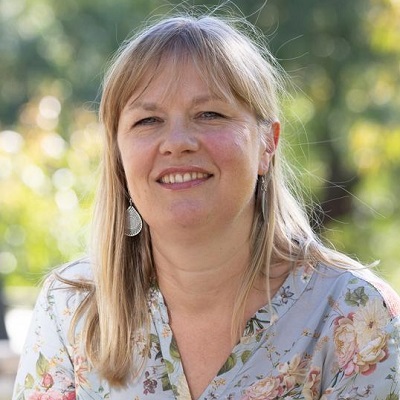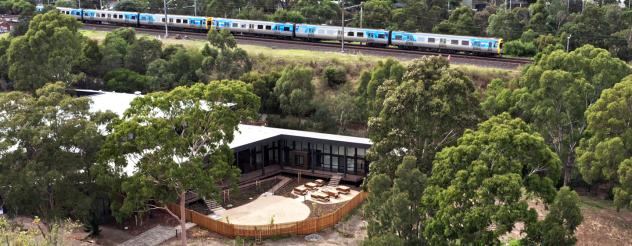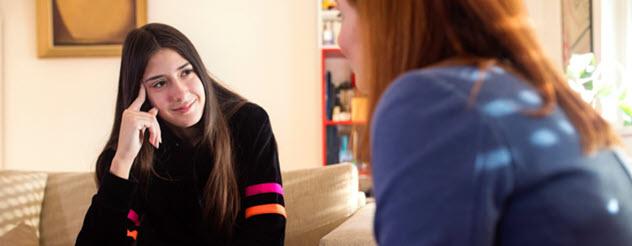
- Home
- World Mental Health Day 2022: Helping young people have hope for the future
October is National Mental Health Month, an initiative of the Mental Health Foundation Australia, and this year’s theme is ‘Building Resilience: Communities and Connections’.
World Mental Health Day 2022 is also recognised on Monday 10 October, with this year focusing on making mental health a global priority.
In recognition of both events, we spoke to Recovery Coordinator Katharine Davies from Orygen – the world's leading research and knowledge translation organisation focusing on mental ill-health in young people – about how their new Youth Prevention and Recovery Care centre is making a difference.
Depression, anxiety and behavioural disorders are among the leading causes of illness and disability in young people. But with early intervention – and health care facilities designed to meet their needs – young people are supported to get the help they need.
The Victorian Government is investing $141 million to deliver new and refurbished youth prevention and recovery care (YPARC) facilities across the state, as part of its response from the Royal Commission into Victoria’s Mental Health System.
A new mental health facility for young people opened in Parkville earlier this year. Known as Orygen Recovery, the $11.9 million North West Metropolitan YPARC service provides up to 28 days of treatment and support in a residential setting for young people aged between 16 – 25 who are experiencing mental ill health.
Adjacent to the Orygen Youth Mental Health facility, the new centre is built over two levels, and provides 10 private bedrooms on each level. The lower level is called Garrang (meaning wattle) and the upper level is called Bunjil, (meaning eagle). The names were chosen by young people with lived experience of mental ill-health, in consultation with the Wurundjeri Woi-wurrung Cultural Heritage Aboriginal Corporation.
Offering a short‑term ’step up’ from community care or ‘step down’ from hospital, the YPARC service is staffed 24 hours, with support offered in a home-like setting, with shared kitchen, dining, lounge room and activity spaces.
Providing the right support
Katharine Davies is a Recovery Coordinator for Orygen, joining North West Metropolitan YPARC centre when it opened earlier this year.
With more than 30 years’ experience as a Registered Psychiatric Nurse and having worked in adult prevention and recovery care services, Katharine has seen first-hand how these important residential facilities are supporting people experiencing mental ill health take important steps towards their recovery.
Orygen has a multi-disciplinary team, consisting of youth wellbeing team peer workers, family peer workers and clinicians. The Youth Wellbeing Team ensures the experiences of young people is non-clinical and focusses on psychosocial recovery and personal recovery goals.
‘The peer space has been very important, which is staffed by two youth peer workers and family peer workers, supporting young people and their family,’ says Katherine.
The clinical element holds clinical governance, provides clinical expertise, and oversight to the program. Input from their leadership team, nurses and psychiatrists ensures they’re using evidence-based practise and treatment within the program. Regular reviews and management of their mental health and risks is also integrated.
The young people at North West Metropolitan YPARC centre vary from 16 to 25 years old, with the average age being 19. Each young person has a therapist or case manager within Orygen, and are willing and motivated to be at Orygen, with most staying for around 25 days.
Katharine explains the young people typically have a specific focus that they want to work on, with most bonding over a common form of social anxiety.
‘The young people start connecting very quickly. Friendships have been developed that continue after they leave. The feedback they are providing us suggests that the group program and key working are beneficial. They are learning and feeling better than when they first arrived,’ said Katharine.
An alternative to hospital-based care
The YPARC services including the new North West Metropolitan Youth Prevention and Recovery Care in Parkville provides an alternative to hospital admission with its flexible, and around-the-clock clinical care for young people, with recovery-focused treatment.
‘One of our aims is to prevent a hospital admission occurring in the first place. We can do this by encouraging early intervention and placement into our program before a deterioration in mental state and therefore an admission,’ Katharine said.

Katharine Davies, Recovery Coordinator at Orygen‘We provide a very active, engaging program and we keep striving to create a family and home-like environment where young people not only feel safe but energised to work on their physical and mental health.’
Design for better wellbeing
The YPARC facility in Parkville has been designed to encourage independence, self-care, and routine for young people. The building is bright, modern, and safe, surrounded by peaceful parklands, to support the centre’s non-clinical psychosocial approach.
Group programs offered, such as cooking, have proved a popular way to support young people in staying focused on their goals in an educational, therapeutic and fun manner.
Having a nurse or general clinician on site each day also means young people can work in collaboration with their key nurse, keyworker and their case manager.
‘What is unique to YPARCs is the midway meeting that allows the young person to tell their case manager, community worker or family member what they are doing and what improvements they have made.
‘We also set an exit date well in advance so they have a date that they can work towards and also start the linkages back home,’ explains Katharine.
A brighter future
Since opening its doors in mid-May 2022, the YPARC centre in Parkville has supported many young people experiencing mental ill health. The facility has also improved communication with family through education and family peer worker support, as well as aided young people to overcome their anxiety of connecting with others.
For Katharine, it’s about young people becoming more in control of their own lives to build resilience and contribute back to their community.
‘Meaningful relationships, connections and purpose are all part of the recovery journey. The YPARC we operate here in Parkville is all about instilling this in young people, giving them hope for their future.’
Getting mental health support
Mental health helplines can provide support if you or someone you know is experiencing mental ill health:
- Beyondblue – call 1300 224 636 for telephone support, information and resources for people dealing with depression or anxiety.
- Lifeline – call 13 11 14 for this free, 24-hour Australia-wide crisis support and suicide prevention service.
- Kids Help Line – call 1800 55 1800 for free counselling and advice for young people between the ages of five and 25.
A comprehensive list of counselling, online and phone supports for mental illness is available on the Better Health Channel website.
Subscribe to stay up-to-date

Stay up-to-date on our announcements and projects by signing up to our online newsletters.
Related content

30 October 2025
Youth prevention and recovery care centre expansion and upgrade program
The Victorian Government is investing $141 million to deliver new YPARCs across the state to support youth mental health.
30 March 2022
North West Metropolitan Youth Prevention and Recovery Care centre
The Victorian Government invested $11.9 million in the new North West Metropolitan Youth Prevention and Recovery Care (YPARC) centre.
16 September 2022



